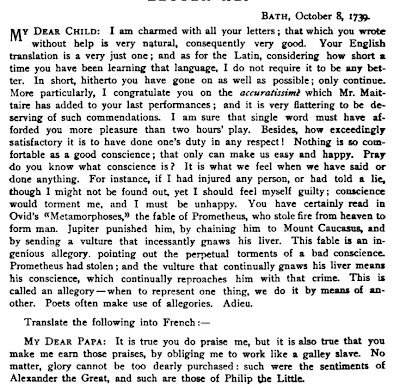I decided to illustrate this by constructing my own “classical”
stages of development based upon the four classical modes of knowledge. Perhaps in fifty years someone will launch a
school based on my model. Probably not,
since I haven’t written any mystery novels or translated Dante. Oh well, stranger things have happened.
| Four Classical Modes | Example of Knowledge | Ages | Stages of the Modes |
| of Knowledge | |||
| POETIC | Trusting another's love, experience | 2-10 | Delight in sense experience; observation and interaction with nature and the world of real objects; authority based learning; love of stories, songs, and poetry; imaginative play |
| SCIENTIFIC | Absolute certitude: the whole is greater than the part; motion presupposes agency | 8-12 | Black and white thinking, beginning of abstract thinking, questions about principles, certainty |
| RHETORICAL | Persuaded by evidence, but without conclusive proof, as when we vote for a political candidate | 10-14 | Debate, discussion, and argument. Questioning and searching for meaning, engagement with the world of ideas; analysis |
| DIALECTICAL | Concluding one of two opposing arguments beyond a reasonable doubt, as a laboratory test to certify a drug for human use | 12-16 | Modern scientific reasoning, applied mathematics, Socratic method |
| Source of modes and examples: John Senior, The Restoration of Christian Culture and James Taylor, Poetic Knowledge | |||
Please note that memorization does not play a part in my
stages of development. This is
intentional, because in a classical understanding of education, one does not “know”
unless one has the knowledge within the memory.
Each stage has its appropriate objects of memorization that are cemented in the mind through use. The Poetic stage would include the memory
of poems, scripture, stories, math facts, names of places and animals, etc. The Scientific stage would include memory of
axioms and geometric proofs. The
Rhetorical stage would include memory of great speeches, etc..
Any comments or improvement to my stages would be welcomed, just remember that I am only half serious. The problem with a scheme like Sayers's is that it can harden into a method that excludes things. So my Poetic stage might be wholly missing from a classical school that uses Sayers's "grammar stage".
 Where prudence, the first cardinal virtue, is knowing the good, the second cardinal virtue, justice, is the art of doing the good. Justice is the virtue that concerns how we live with our fellow man. It has been classically defined as giving to each person his due. Justice concerns the cluster of virtues concerned with relationships including piety, gratitude, friendship, gentleness, hospitality, liberality, and equity. All of us tend to favor ourselves at the expense of others, but the just man or woman gives to each their due and treats them as he would be treated.
Where prudence, the first cardinal virtue, is knowing the good, the second cardinal virtue, justice, is the art of doing the good. Justice is the virtue that concerns how we live with our fellow man. It has been classically defined as giving to each person his due. Justice concerns the cluster of virtues concerned with relationships including piety, gratitude, friendship, gentleness, hospitality, liberality, and equity. All of us tend to favor ourselves at the expense of others, but the just man or woman gives to each their due and treats them as he would be treated. 









